-
Win32/Bayrob trojan has been intensely targeting users since mid-December 2015
-
Cyber criminals behind the attack seek financial benefits: they look for debit and credit card details, online banking login and password
-
So far attackers have focused mainly on Europe, South Africa, Australia and New Zealand with Germany and Spain being two of the countries most affected









